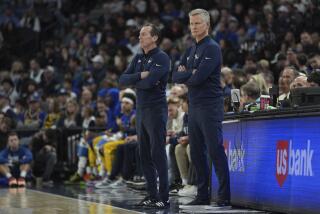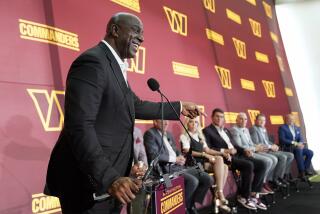With Bulls, Collins Is Making Race of It
- Share via
CHICAGO — There once was a fat guy named Jeff. They called him Super Fan. Jeff’s job--he never got paid, but he did get free admission--was to run laps around Chicago Stadium, around the basketball court, to the accompaniment of the “William Tell Overture.” The faster the Lone Ranger’s theme played, the faster Jeff was supposed to run.
He was Sunday Silence on two legs. Super Fan, who was in his 20s, usually ran for about two minutes. He wore a faded white T-shirt with a Chicago Bulls emblem, and his tummy always drooped from the bottom of it, as with one of those stereotypical home repairmen whose bellybutton and rear cleavage are indecently exposed.
Unlike Dancin’ Barry, who entertains at Laker games no more than once a night, Super Fan got his backfield in motion during just about every timeout. Around and around he’d go, and where his heart would stop, nobody’d know. Everybody fretted for his health and welfare. Possible pump failure aside, there also was the ever-present danger that some wise guy would stick his foot out, sending Runaround Supe pitching headfirst into the scorer’s table or into Jerry Sloan’s lap or some such place.
Well, he survived the experience, and now a decade of Chicago basketball has passed. The running of the Bulls continues, but Super Fan has been replaced.
By Doug Collins’ victory dash.
Any time the Bulls win, their head coach celebrates with a joyful sprint from bench to locker room. In the tradition of Red Auerbach’s lighting of a triumphant cigar, or Tom Lasorda’s stampede to the mound for the ceremonial hug, or New Orleans Saint owner Tom Benson’s sideline dance, Doug Collins has ushered in a new era of celebration in Chicago, which, to be honest, seldom gets to celebrate too much.
“It was just a spontaneous thing,” Collins explained. “Still is, in a way, although people have told me they get a kick out of it. I hope it doesn’t look foolish.”
On the contrary, Collins has good form. Also, he gets particularly good traction these days, now that he and everybody on his team--and everybody in town, judging by a stroll down Michigan Avenue--is wearing their new lucky black sneakers. It was that ol’ shoe salesman Michael Jordan’s original idea, having the Bulls don black shoes for the playoffs, to change their luck. Since then, Cleveland has fallen, New York has fallen, and Detroit has lost two out of three. Sales of white shoes at Chicago stores are at a standstill.
“Whatever works,” Collins said.
He is a popular figure now that joy has come to Windville, easily the most successful coach of this unsuccessful franchise since Dick Motta. The Bulls have a chance to reach pro basketball’s championship series for the first time in their 23 years, and, under Collins, they have become an SRO act at the Stadium and the National Basketball Assn.’s No. 1 attendance draw on the road, although a certain No. 23 is the one and only reason for that.
Although Collins and Jordan have had their differences, the player gives the coach a considerable amount of credit for Chicago’s sudden rise, saying, “It took guts to do some of the things Doug Collins did.”
Such as, persuading Jordan to change positions.
“I was reluctant. I think everybody knows that by now,” Jordan said. “When Doug first approached me with the idea of playing point guard, I couldn’t figure out why they would want to tamper with my game. I knew we needed to make changes to become a better team, but I never dreamed somebody would think of changing me. “
Collins thought Jordan should have the basketball from start to finish, rather than having to run from side to side trying to get free. Not only could Jordan view the entire court, but he could get the other players involved in the offense, create situations for the forwards and center who felt guilty every time they shot instead of passing off to Michael.
“Michael’s got the ball more now, which presents a dangerous situation for anybody,” Collins said. “Magic Johnson is always making something happen for the Lakers. He doesn’t stand around waiting for something to happen. Magic doesn’t wait for the ball to come to him. We want the ball in Michael’s hands as much as possible, and yet, since he switched positions, he’s been able to arrange more good shots for everybody else.”
Collins and Jordan have become much closer. The superstar could understand that he might not be consulted on every management decision, but resented it deeply when he was sitting alongside Charles Oakley at a prizefight and his teammate turned to him and mentioned that he was no longer a teammate, having just been traded to New York. Jordan couldn’t believe this was the first he had heard about it.
Now, Jordan trusts Collins’ instincts a bit more. The trade that brought center Bill Cartwright to the Bulls has not been the disaster for the coach and General Manager Jerry Krause that many thought it would be, to the point that even Detroit forward John Salley says it “makes them look like executives of the year.” And, the move to point guard by Jordan has paid off royally.
Better still for Jordan, he has been given assurances that he will get a say in the NBA college draft. The Bulls choose sixth, and Jordan wants to have some influence over what he thinks they need more--whether it be a shooter (Glen Rice?), a power forward (J.R. Reid?) or the best man available. Collins is open to Jordan’s suggestions.
A curious choice to run the team, Collins had never coached on any level. He had been an NBA player for the Philadelphia 76ers and had done some broadcasting for CBS. That’s it. Krause, figuring the Bulls already had tried seasoned veterans from Larry Costello to Kevin Loughery to Stan Albeck, decided to bring in somebody completely fresh, as his predecessors once did, quite successfully, with Motta, although Motta had been a successful college coach.
“I may not have had any experience but I always considered myself a student of the game,” Collins said. “On the bench in Philadelphia, I didn’t just sit there drinking Gatorade. I paid attention to the coaches’ strategy, to their substitutions. I asked questions. If broadcasting had remained my occupation, that would have been all right, but deep down I always hoped I could coach.”
He can. He even has a chance--not a great chance, but a chance--to coach an NBA champion. After all, the Bulls are still in the running, and running is what Doug Collins does best.
More to Read
Go beyond the scoreboard
Get the latest on L.A.'s teams in the daily Sports Report newsletter.
You may occasionally receive promotional content from the Los Angeles Times.










